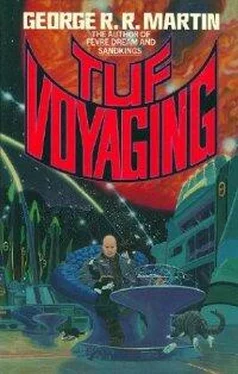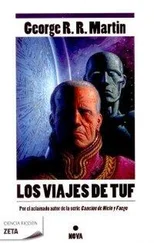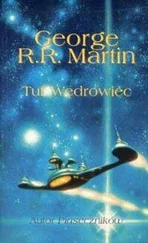“Let me stress that the devastation on Hro B’rana is extreme, and the underpopulation severe, despite the fact that the environment is not especially harsh. Why? Well, the degenerate descendants of both Hruun and dactyloid colonists, whose cultures are otherwise utterly different and very hostile to each other, have a common answer to that: the plague star. Every third generation, just as they are climbing out of their misery, as populations are swelling once again, the plague star waxes larger and larger in their nighttime skies. And when this star becomes the brightest in the heavens, then the season of plagues begins. Pestilences sweep across Hro B’rana, each more terrible than the last. The healers are helpless. Crops wither, animals perish, and three-quarters of the sentient population dies. Those who survive are thrown back into the most brutal sort of existence. Then the plague star wanes, and with its waning the plagues pass from Hro B’rana for another three generations. That is the legend.”
Haviland Tuf’s face had been expressionless as he listened to Celise Waan relate the tale. “Interesting,” he said now. “I must surmise, however, that our present expedition has not been mounted simply to further your career by investigating this arresting folk tale.”
“No,” Celise Waan admitted. “That was once my intent, yes. The legend seemed an excellent topic for a monograph. I was trying to get funding from the Center for a field investigation, but they turned down my request. I was annoyed, and justly so. Those shortsighted fools. I mentioned my annoyance, and the cause, to my colleague, Jefri Lion.”
Lion cleared his throat. “Yes,” he said. “And my field, as you know, is military history. I was intrigued, of course. I buried myself in the Center databanks. Our files are not nearly as complete as those at Avalon and Newholme, but there wasn’t time for a more thorough investigation. We had to act quickly. You see, my theory—well, it’s more than theory, really—I believe, in fact I’m all but certain, that I know what this plague star is. It’s no legend, Tuf! It’s real. It must be a derelict, yes, abandoned but still operational, still carrying out its programs more than a millennium after the Collapse. Don’t you see? Can’t you guess?”
“I admit to failure,” said Tuf, “lacking your familiarity with the subject at hand.”
“It’s a warship, Tuf, a warship in a long elliptical orbit around Hro B’rana. It’s one of the most devastating weapons Old Earth ever put into the void against the Hrangans, in its own way as terrible as that mythical hellfleet they talk about from those last days before the Collapse. But it has vast potential for good as well as ill! It’s the repository of the most advanced biogenetic science of the Federal Empire, a functioning artifact packed full of secrets lost to the rest of humanity.”
“Indeed,” said Tuf.
“It’s a seedship,” Jefri Lion finished, “a biowar seedship of the Ecological Engineering Corps.”
“And it’s ours ,” said Kaj Nevis, with a small grim smile.
Haviland Tuf studied Nevis briefly, nodded to himself, and rose. “My curiosity is satisfied,” he announced. “Now I must fulfill my portion of the trade.”
“Ahhh,” said Celise Waan. “My meat.”
“The supply is copious, though the variety is admittedly small,” said Haviland Tuf. “I shall leave you the task of preparing the meat in a manner most pleasant to your palate.” He went to a storage locker, punched in a code, and removed a small carton, which he carried back to the table under his arm. “This is the only meat aboard my vessel. I cannot vouch for its taste or quality. Yet I have not yet received a complaint on either count.”
Rica Dawnstar burst into laughter and Kaj Nevis snickered. Haviland Tuf, neatly and methodically, removed a dozen cans of catfood from their carton, and stacked them in front of Celise Waan. Havoc leapt onto the table and began to purr.
“It’s not as big as I expected,” Celise Waan said, her tone as petulant as ever.
“Madam,” said Haviland Tuf, “the eyes can often deceive. My main viewscreen is admittedly modest, a bare meter in diameter, and this must of course diminish the size of any object displayed thereon. The ship itself is of sizable dimensions.”
Kaj Nevis came forward. “How sizable?”
Tuf folded his hands together atop the bulge of his stomach. “I cannot say with any precision. The Cornucopia of Excellent Goods at Low Prices is but a modest trading vessel, and its sensory instrumentation is not all that it might be.”
“Approximately, then,” Kaj Nevis snapped.
“Approximately,” Tuf repeated. “Regarded at the angle at which my viewscreen is now displaying it, with the longest axis taken as ‘length,’ the ship we are approaching would seem to be, approximately, some thirty standard kilometers long, approximately some five kilometers in width, approximately some three kilometers in height, but for the domed section amidships, which rises slightly higher, and the forward tower which ascends, approximately, one additional kilometer above the deck from which it rises.”
They had all gathered in the control room, even Anittas, who had been awakened from his computer-regulated sleep when they emerged from drive. A hush fell over them; even Celise Waan seemed briefly at a loss for something to say. All of them stared at the viewscreen, at the long black twisted shape that floated against the stars, here and there shining with faint lights and pulsing with unseen energies.
“I was right,” Jefri Lion muttered at last, to break the silence. “A seedship—an EEC seedship! Nothing else could possibly be so large!”
Kaj Nevis smiled. “Damn,” he said.
“The system must be vast,” Anittas said speculatively. “The Earth Imperials had a sophistication far beyond ours. It’s probably an Artificial Intelligence.”
“We’re rich,” burbled Celise Waan, her many and varied grievances forgotten for the moment. She grabbed hold of Jefri Lion’s hands and waltzed him around in a circle, fairly bouncing. “We’re rich, rich, we’re rich and famous , we’re all rich!”
“This is not entirely correct,” said Haviland Tuf. “I do not doubt that you may indeed become wealthy in the near future; for the moment, however, your pockets contain no more standards than they did a moment ago. Nor do Rica Dawnstar and I share your prospects of economic advancement.”
Nevis stared at him hard. “Are you complaining, Tuf?”
“Far be it from me to object,” Tuf said in a flat voice. “I was merely correcting Celise Waan’s misstatement.”
Kaj Nevis nodded. “Good,” he said. “Now, before any of us get any richer, we have to get aboard that thing and see what kind of shape it’s in. Even a derelict ought to net us a nice salvage fee, but if that ship’s in working order, there’s no limit, no limit at all.”
“It is obviously functional,” Jefri Lion said. “It has been raining plagues on Hro B’rana every third generation for a thousand standard years.”
“Yeah,” said Nevis, “well, that’s true, but it’s not the whole story. It’s dead in orbit now. What about the drive engines? The cell library? The computers? We’ve got a lot to check. How do we get aboard, Lion?”
“A docking might be possible,” Jefri Lion replied. “Tuf, that dome, do you see it?” He pointed.
“My vision is unimpaired.”
“Yes, well, I believe that’s the landing deck under there. It’s as big as a spacefield. If we can get the dome to open, you can take your ship right in.”
“If,” said Haviland Tuf. “A most difficult word. So short, and so often fraught with disappointment and frustration.” As if to underline his words, a small red light came on beneath the main viewscreen. Tuf held up a long pale finger. “Take note!” he said.
Читать дальше












